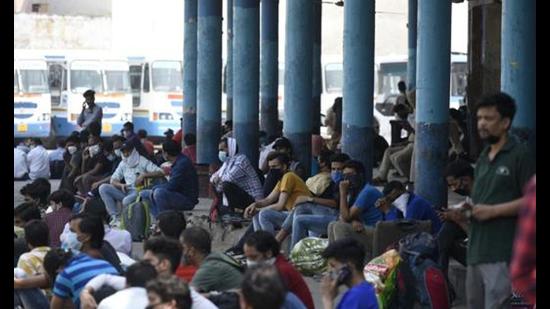The pandemic must lead to a reset of capitalism
World War I paved the way for the departure of monarchies. World War II sparked the Cold War of communism versus capitalism. The fall of the Berlin Wall in the late 1980s paved the way for the collapse of the communist system. Is the coronavirus pandemic laying the groundwork to change the current face of capitalism?
The crowds and chaos are back almost in full force. Trains from Bihar, Jharkhand and eastern Uttar Pradesh going to metros are packed. With the process of unlocking underway, migrants are flocking back to the cities and towns from villages in search of work. These are the very cities which had no place for them when the coronavirus pandemic intensified, establishments closed and the government did precious little to alleviate their problems.

The advent of the coronavirus opened their eyes to the realities of the economy — there really can be no gram swaraj. This concept propounded by Mahatma Gandhi could have reduced economic inequality and created growth hubs in villages. But this has not happened. In a country where 63 families have more assets than the total annual budget of the country, and where the total wealth of nine people is equal to the wealth of 50% of the country’s population, the dream of gram swaraj looks virtually unrealisable.
It was not so long ago that politicians were assuring people that migrants need not return to cities at all, that their livelihood needs would be catered to in their villages. The central and state governments have provided free rations and some degree of cash support to about 800 million people. But people need work to generate a steady income to meet their needs. That people are coming back in droves to metros shows that they know that they cannot depend on the government’s largesse.
But, will their problems end when they get back to work in the cities? No, they will not. The pandemic has crushed many people economically. Markets may have opened, but the pace of business is sluggish. Production in factories has been disrupted, and this has had an adverse impact on employment and wages. The economy will surely pick up, but it will take at least three to four years to return to a pre-Covid-19 state. It is not as though India’s economy was in good shape before the pandemic. Our economy had been on a downward slide for several quarters, the job market was stagnant and the markets were not performing to expectations. A long recession was already being predicted.
The condition of Indian women has worsened, with its already diminished labour work force participation set to dip further. Economic inequality will increase too. Last week, the World Bank released a report which predicts that the economic gap will widen due to the pandemic. This report says that an additional 125 million people had fallen below the poverty line at the beginning of this year. This number is for those living on less than $1.9 daily. In India, those who spend more than ₹32 per day are not counted as being below the poverty line. According to a study by Azim Premji University, 230 million Indians have fallen below the poverty line.
From 1990 till the beginning of the Covid-19 pandemic, India had pulled 300 million people out of economic distress. The pandemic has ruined the good work of the last three decades. How long will it take to get over this dire situation? No one can predict this accurately as of now. A recovery could have been possible if we were on track to vaccinate at least 80% of the people before December. But that does not look remotely likely at the moment.
Countries such as China and the United States will recover soon, but dozens of vulnerable countries in Asia, Africa and Eastern Europe will have to wait much longer to emerge from this crisis. These times force us to pause and ponder on how most economic theories have proved ineffective. We have gone through two deadly global pandemics in the last 100 years, we have seen the fall of monarchies, the rise of democracies, and robust capitalism versus socialism debates in this period. Once a bastion of communism, Russia, or more precisely Moscow, now houses seven out of the top 100 super-rich in the world. What did the capitalist system to which paeans of praise were sung after the collapse of the Soviet Union give us over the last three decades? Not all the solutions it promised, quite clearly.
The pandemic has also exposed the hollowness of slogans such as global village and vasudhaiva kutumbakam. Neither Left nor Right ideologies hold any answers anymore. Clearly, the post-pandemic world will have to fundamentally restructure itself. This has been the pattern after every pandemic and every great war. World War I paved the way for the departure of monarchies. World War II sparked the Cold War of communism versus capitalism. The fall of the Berlin Wall in the late 1980s paved the way for the collapse of the communist system. Is the coronavirus pandemic laying the groundwork to change the current face of capitalism?
Shashi Shekhar is editor-in-chief, Hindustan
The views expressed are personal



